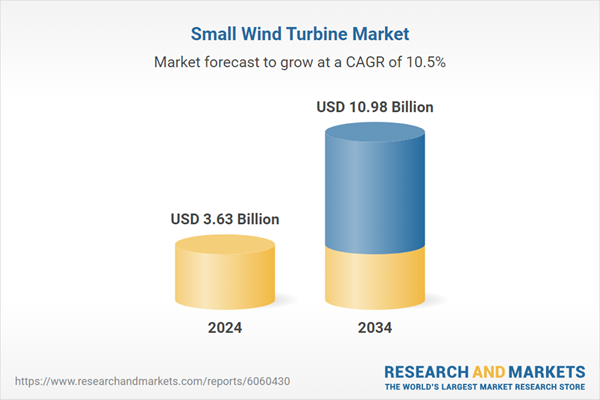In developing regions, small wind turbines are emerging as a reliable and affordable solution for decentralized energy generation. Their increasing adoption in off-grid areas is facilitating electrification in rural communities across Asia and Africa. The growing popularity of urban wind turbines, which capture wind energy from multiple directions while maintaining low noise levels, is further influencing market dynamics. The integration of advanced materials, aerodynamics, and controller technologies is making small wind systems more attractive to homeowners and businesses. Additionally, financial incentives and government programs supporting clean energy initiatives are strengthening the market outlook. The rising demand for micro turbines in residential applications is further boosting adoption, helping consumers lower electricity costs and achieve energy independence.
The industry is gaining momentum as nations emphasize reducing greenhouse gas emissions and expanding renewable energy adoption. The increasing electrification of emerging economies and the global shift away from conventional power sources are key factors supporting market expansion. Among different installation types, rooftop small wind turbines are gaining traction, with projected growth exceeding 11% through 2034. These systems harness high-altitude wind currents, enabling homeowners, businesses, and communities to generate on-site electricity. Recent technological advancements are enhancing their efficiency while reducing noise and improving aesthetics, making them an appealing energy solution.
Standalone small wind turbines are also seeing rising demand, particularly in off-grid and rural locations. Technological improvements, declining costs, and the growing need for sustainable energy solutions are driving their adoption. Innovations in blade design, control mechanisms, and materials are improving turbine performance, making them a preferred choice for remote installations. Small wind turbines in the 10 kW to 50 kW range are expected to account for 50% of the market share in 2024, primarily due to increasing demand for clean energy in isolated regions and regulatory support for rural electrification. Their deployment in residential areas and the growing preference for off-grid solutions across homes, farms, and communities are reinforcing market trends.
North America small wind turbine sector is poised for strong growth, with projections indicating it will surpass USD 1.1 billion by 2034. Government policies promoting wind energy, coupled with funding for research and development, are fostering industry expansion. Support for manufacturers focused on small and medium-scale wind turbines is further reinforcing market growth, creating a favorable business environment for continued innovation.
Comprehensive Market Analysis and Forecast
- Industry trends, key growth drivers, challenges, future opportunities, and regulatory landscape
- Competitive landscape with Porter’s Five Forces and PESTEL analysis
- Market size, segmentation, and regional forecasts
- In-depth company profiles, business strategies, financial insights, and SWOT analysis
This product will be delivered within 2-4 business days.
Table of Contents
Companies Mentioned
The companies featured in this Small Wind Turbine market report include:- Aeolos Wind Energy Ltd
- Airturb
- Avant Garde Innovations Pvt Ltd
- Bergey Windpower
- City Windmills
- Northern Power Systems
- Plugin India
- Ryse Energy
- SDWE
- Senwei Energy
- TESUP
- TUGE
- Unitron Energy
- Vestas
- Wind Energy Solutions
Table Information
| Report Attribute | Details |
|---|---|
| No. of Pages | 125 |
| Published | February 2025 |
| Forecast Period | 2024 - 2034 |
| Estimated Market Value ( USD | $ 3.63 Billion |
| Forecasted Market Value ( USD | $ 10.98 Billion |
| Compound Annual Growth Rate | 10.5% |
| Regions Covered | Global |
| No. of Companies Mentioned | 16 |









